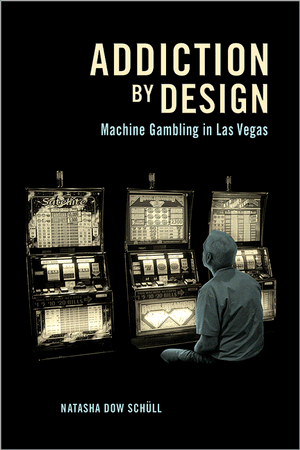
ADDICTION BY DESIGN
Machine Gambling in Las Vegas
Princeton University Press, September 2012
Winner, Sharon Stephens Prize, American Ethnological Association
Honorable mention, Gregory Bateson Prize, Society for Cultural Anthropology
Slot machines, revamped by evermore compelling digital and video technology, have unseated traditional casino games as the gambling industry’s revenue mainstay. Drawing on fifteen years of field research in Las Vegas, anthropologist Natasha Dow Schüll explores the dark side of machine gambling—a solitary, rapid, continuous form of play that has less to do with the competitive thrill of winning than with the pull of “the machine zone,” as gamblers call the trancelike state they enter. Addiction by Design takes readers from industry conventions and casino floors into gamblers’ everyday lives, from the strategic planning of game algorithms to Gamblers Anonymous meetings and regulatory debates over whether addiction to slot machines stems from the consumer, the product, or the interplay between the two. At stake in Schüll’s account of the intensifying traffic between people and machines of chance is a blurring of the line between design and experience, profit and loss, control and compulsion.
REVIEWS AND ENDORSEMENTS
“Addiction by Design . . . reads like a combination of Scientific American’s number puzzles and the ‘blue Book’ of Alcoholics Anonymous.”
—Christopher Caldwell, Financial Times
“If books can be tools, Addiction by Design is one of the foundational artifacts for understanding the digital age—a lever, perhaps, to pry ourselves from the grasp of the coercive loops that now surround us.”
—Alexis Madrigal, Senior Editor, The Atlantic
“Addiction by Design is a nonfiction page-turner. Worth reading for the excellence of the ethnographic narrative alone, it is also an empirically rigorous examination of users, designers, and objects that deepens practical and philosophical questions about the capacities of players interacting with machines designed to entrance them.”
—Laura Norén, PublicBooks
“A stunning portrayal of technology and the inner life. Searing, sobering, compelling: this is important, first-rate, accessible scholarship that should galvanize public conversation.”
—Sherry Turkle, Massachusetts Institute of Technology, author of Alone Together: Why We Expect More from Technology and Less from Each Other
“A fascinating, frightening window into the world of gambling in Las Vegas and the technological innovations that deliberately enhance and sustain the ‘zone’–the odd, absorbed state for which extreme machine gamblers yearn. An astute and provocative look at addiction and its complex moral, social, and emotional entanglements.”
—T. M. Luhrmann, Stanford University
“At the heart of Schüll’s book is the interplay between the players and the machine; between the players and the machine manufacturers; between the players and the math program; and between the players and the ‘zone’ that the machines help produce. A tour de force that changes the dialogue on gambling addiction.”
—Henry Lesieur, author of The Chase: Career of the Compulsive Gambler
“Schüll’s clear and dramatic writing style is itself addictive. One is drawn into the ways in which the interactions among the different stakeholders lead to players’ experience of being drawn into a ‘zone’ where they remain until all resources are gone. This is a must-read narrative that points to the many variants of screen addiction possible today.”
—Don Ihde, author of Bodies in Technology
“This gripping, insightful, and poignant analysis of machine gambling offers a kind of object lesson in the intensified forms of consumption that computer-based technologies enable. An exemplary case of the way in which close, critical investigation of specific sites of capitalism can provide a deeper understanding of both intimate experience and widespread socioeconomic arrangements.”
—Lucy A. Suchman, author of Human-Machine Reconfigurations
“Schüll offers a provocative and important study of the imperative some people feel to lose themselves in a machine. The ethnography is rich and deep, shedding original light on the significance of addiction and gambling in American culture. The story told in the book is absolutely riveting.”
—Emily Martin, author of Bipolar Expeditions